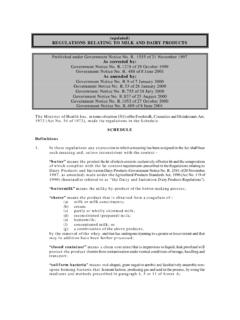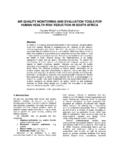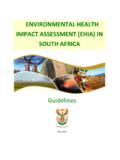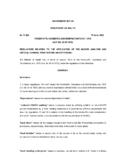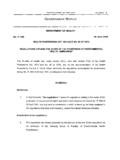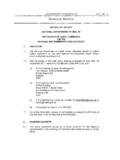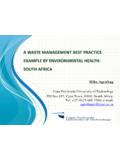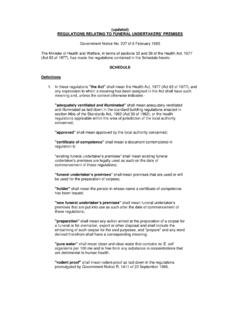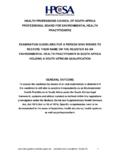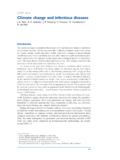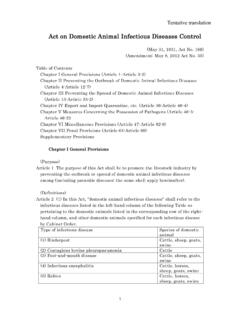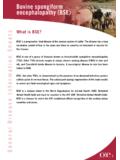Transcription of GOVERNMENT NOTICE - EHRN
1 3 STAATSKOERANT, 13 APRIL 201 0 GOVERNMENT NOTICE DEPARTMENT OF HEALTH No. R. 287 13 April 2010 NATIONAL HEALTH ACT, 2003 (ACT NO. 61 OF 2003) REGULATIONS RELATING TO COMMUNICABLE DISEASES The Minister of Health intends, in terms of section 90(1) U) of the National Health Act, 2003 (Act No. 61 of 2003), to make the regulations in the schedule. Interested persons are invited to submit any substantiated comments on the proposed Regulations, or any representations they may wish to make in regard thereto, to the Director-General: Health, Private Bag X828, Pretoria, 0001 -for the attention of the Director: Communicable Disease Control within one month of this NOTICE . SCHEDULE Definitions 1. In these regulations, any word or expression to which a meaning has been assigned in the Act shall have the meaning so assigned and, unless the context indicates otherwise: 'address' means a place of ordinary residence, but excludes a post office box number; 'body' means human remains, but excludes remains of a body which has been cremated; 'bury' means to dispose of a body and where applicable may include the placenta, foetus, any severed part or exhumed human remains; Reproduced by Sabinet Online in terms of GOVERNMENT Printer s Copyright Authority No.
2 10505 dated 02 February 1998 4 GOVERNMENT GAZETTE, 13 APRIL 2010 'carrier' means a person or animal infected with a specific infectious agent but shows no marked symptoms of the disease caused by that infectious agent. It may also be an inanimate object contaminated with a specific infectious agent. A carrier may be a potential source of infection; 'child' means a person under the age of 18 years; 'committee' means the Communicable Diseases Advisory Committee established in terms of regulation 2(1); 'communicable disease' means a disease resulting from an infection due to pathogenic agents or toxins generated by an infection, following the direct or indirect transmission of the agents from the source to the host; 'Director-General' means the Director-General of the Department of Health; 'emerging infectious diseases' means diseases that have newly appeared in a popuiation; 'epidemiology' means the study of the distribution and determinants of disease, injury and other health-related conditions in a defined human population.
3 'health care associated infection (nosocomial or hospital-associated infection)' means an infection acquired in a health care establishment by a health care user, health worker, or a visitor to a health care establishment, who was in the establishment for a reason other than that infection; 'infectious agent' means an organism or toxin which may cause an infection or communicable disease in a person; 'immune contact' means any person who, owing to his or her having contracted a communicable disease in the past or his or her having been successfully immunised against it, is not likely to contract the disease again on exposure thereto; 'isolation' means the separation of persons who are ill or suspected of having a specific infectious disease from those who are healthy, with the objective of preventing transmission of infection and allowing for specialised care; 'isolation precautions' means procedures, methods or processes used in nursing care to protect health care workers, patients and other persons against Reproduced by Sabinet Online in terms of GOVERNMENT Printer s Copyright Authority No.
4 10505 dated 02 February 1998 5 STAATSKOE RANT. 13 APRIL 2010 infectious agents transmitted from a patient or patients suffering from a communicable disease; 'local GOVERNMENT ' means a municipality and includes all municipal entities under the sole or shared control of the municipality within the meaning of the Local GOVERNMENT : Municipal Finance Management Act, 2003 (Act No. 56 of 2003); and all organs of state in that municipality or such municipal entity under the Intergovernmental Relations Framework Act, 2005 (Act No. 13 of 2005); 'National Health Laboratory Service' means the organisation established in terms of the National Health Laboratory Service Act. 2000 (Act No. 37 of 2000). hereinafter referred to as the NHLS; 'National International Health Regulations (IHR) Focal Point' means the national centre, designated by each State Party, which shall be accessible at all times for communications with World Health Organisation's (VVHO) lHR Contact Points under the International Health Regulations; 'notifiable medical condition' means a medical condition that must be reported in terms of a statutory obligation; 'official responsible for health at local GOVERNMENT ' means a person responsible for health at that level; 'poisoning' means to administer poison or an infectious agenUtoxin or to contaminate with poison either intentionally or unintentionally.
5 'public health emergency of international concern' means an extraordinary event which is determined. as provided in the International Health Regulations (2005): (i) to constitute a public health risk to other States through the international spread of disease, and (ii) to potentially require a coordinated international response; 'public health risk' means a likelihood of an event that may affect adversely the health of human populations, with the emphasis on one which may spread internationally or may present a serious and direct danger; Reproduced by Sabinet Online in terms of GOVERNMENT Printer s Copyright Authority No. 10505 dated 02 February 1998 6 No. 33107 GOVERNMENT GAZETTE, 13 APRIL 2010 'quarantine' means separation and restriction of movement or activities of "healthy" persons, animals, or goods that have been exposed or are suspected to have been exposed to an infectious agent and may be incubating the disease through: (i) the removal, or limitation of freedom of movement of a person or animal ; or (ii) the removal or restriction of movement of vehicles, goods, articles or any other things that have been exposed or are suspected of having been exposed to a communicable disease, until such time the risk of disease transmission no longer exists.
6 're-emerging infectious diseases' means diseases that have existed in the past, but are rapidly increasing in incidence or geographical range; 'susceptible contact' means a person or animal that is at risk of contracting a communicable disease following contact with an infected person and/or animal ; 'the Act' means the National Health Act, 2003 (Act No. 61 of 2003); 'vector' means any agent (living or inanimate) that acts as an intermediate carrier or alternative host for a pathogenic organism and transmits it to a susceptible host; 'World Health Organisation Intemational Health Regulations (IHR) Contact Point' means the unit within the WHO responsible for communications with the National IHR Focal Point; and 'zoonoses' means a disease of animals that can be transmitted to humans.
7 Reproduced by Sabinet Online in terms of GOVERNMENT Printer s Copyright Authority No. 10505 dated 02 February 1998 7 STAATSKOERANT, 13 APRIL 2010 CHAPTER 1 COMMUNICABLE DISEASE STRUCTURES AND RESPONSIBILITIES OF HEALTH ESTABLISHMENTS Establishment of Communicable Diseases Advisory Committee 2(1). There is, hereby established a committee known as the Communicable Diseases Advisory Committee, hereinafter referred to as the "Committee". (2). The Minister appoints the members of the Committee. Constitution of the Committee 3. The Committee shall consist of not less than fifteen (15) but not more than twenty (20) members. The Committee shall be comprised of the following members: (a) at least six (6) but not more than nine (9) persons from the Department, provincial department of health and local GOVERNMENT ; (b) a representative from the private health sector; (c) a representative from the National Institute for Communicable Diseases; (d) two representatives of community groups; (e) the remainder of the members will be appointed from amongst others the academia and health professionals.
8 The Committee must include at least any six (6) of the following experts: (i) a medical specialist with extensive experience in the treatment of communicable diseases in adults; (ii) a medical specialist with extensive experience in the treatment of communicable diseases in children; (iii) a pathologist with extensive experience in laboratory diagnosis of infectious agents; Reproduced by Sabinet Online in terms of GOVERNMENT Printer s Copyright Authority No. 10505 dated 02 February 1998 e No. 33107 GOVERNMENT GAZETTE, 13 APRIL 2010 (iv) a specialist in public health medicine with skills and experience in the management of outbreaks, epidemics and disasters and the epidemiology and surveillance of communicable diseases; (v) a health care provider with experience in health information systems, in the employ of a health establishment; (vi) a person with experience in the management and prevention of environmental hazards conducive to the origin or spread of communicable diseases; (vii) a health care provider with extensive experience of hospital infection prevention and control programmes; (viii) a veterinarian with extensive experience in the control of zoonoses.
9 (ix) an entomologist with extensive experience in the research and control of human disease vectors; or (x) an occupational health expert; (f) the appointment of members of the Committee is for a period of three (3) years, but they shall be eligible for re-appointment; and (g) the Minister, on good cause shown, may terminate the appointment of any member of the Committee or sub-committees. Chairperson and Vice-Chairperson 4(1) At the first meeting of every newly constituted Committee, the members of the Committee shall elect the chairperson and a vice-chairperson from among themselves. (2) The chairperson and vice-chairperson shall hold office during the term of office of the members of the Committee, unless the chairperson and the vice-chairperson shall sooner resign or cease to be a member of the Committee.
10 (3) The vice-chairperson may, if the chairperson is absent or for any reason unable to act as chairperson, perform all the functions and exercise all the powers of the chairperson. Reproduced by Sabinet Online in terms of GOVERNMENT Printer s Copyright Authority No. 10505 dated 02 February 1998 9 STAATSKOERANT, 13 APRIL 2010 (4) If both the chairperson and vice-chairperson are absent from any meeting, the members present shall elect one of their members to preside at that meeting and the person so presiding may, during that meeting and until the chairperson and/or the vice chairperson resumes duty, perform all the functions and exercise all the powers of the chairperson. (5) If both the chairperson and the vice-chairperson have been given leave of absence, the members of the Committee shall elect one of their members to act as chairperson until the chairperson and/or the vice-chairperson resumes duty or vacates office.
